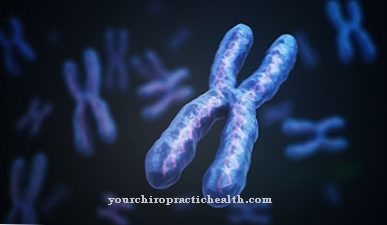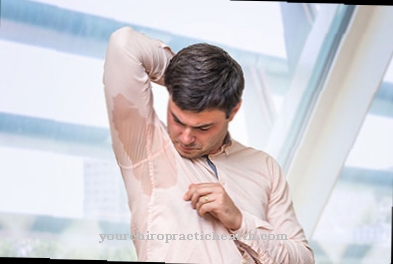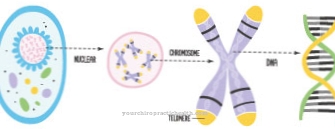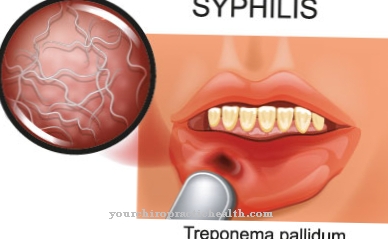The Desiccosis is the medical term for a physical Dehydration in humans. It is generally the result of a lack of fluids.
What is dehydration (desiccosis)?
Desiccosis describes the dehydration of the human body due to a lack of fluid and the resulting reduction in body water. This is often confused with so-called dehydration, which only describes an acute lack of water, which is a preliminary stage of desiccosis.
causes
Especially infants and old people are particularly often affected by desiccosis. The former because they only have a very small supply of fluid that they could fall back on in the event of an inadequate supply.
In the elderly, on the other hand, the often decreasing sense of thirst with age and the severely restricted intake of fluids in the case of acute thirst lead to desiccosis. Under certain circumstances, dementia patients can become dehydrated if their caregivers neglect the needs of those affected.
But young people and children who have already passed infancy can also suffer from desiccosis. In this context, diseases such as diabetes, diarrhea or physical ailments such as disphagia (swallowing disorders), kidney problems or burns often play an important role.
If necessary, the use of diuretics, i.e. drugs that lead to dehydration of the body, can also contribute to the development of desiccosis. In addition to all of these causes, a long-term imbalance of fluid intake and fluid release can also lead to desiccosis.
Symptoms, ailments & signs
.jpg)
© Sondem - stock.adobe.com
Desiccosis is characterized by a variety of different symptoms. However, an unmistakable sign of dehydration is the persistence of freshly pulled skin folds. The skin and mucous membranes feel dry. Furthermore, the patient is noticed by an increased excitability with erratic, hasty and aimless movements, which alternate with abnormal sleepiness.
The amount of urine excreted decreases sharply. In extreme cases, the body stops passing urine at all. Urinary substances are retained. The heavy loss of fluid also leads to a sharp drop in blood pressure, which can lead to circulatory shock.
The lack of fluids also causes the viscosity of the blood to increase. This means there is a higher risk of developing thromboses. Furthermore, there is severe weight loss, constipation, seizures and kidney pain. Older patients in particular then suffer from extreme sleepiness, agitation, confusion, disorientation and a reduction in their general condition.
In severe cases, it can also lead to unconsciousness. Without prompt treatment, the desiccosis can lead to death. However, after successful treatment via infusions with an electrolyte solution, the patient's condition returns to normal very quickly. Even patients who were conspicuous due to their high level of aggressiveness are suddenly completely normal again. However, many people affected can no longer remember the previous condition.
Diagnosis & course
The symptoms of desiccosis vary widely and range from barely noticeable dehydration of the mucous membranes and slight concentration disorders to severe headaches, dizziness, muscle cramps, a feeling of weakness, palpitations or problems with chewing and swallowing.
The clearest sign of desiccosis, however, is when wrinkles on the back of the hand cannot be removed and persist over a longer period of time.If no countermeasures are initiated, the desiccosis in most cases leads to oliguria, i.e. insufficient urine excretion and thus to a disturbed metabolism and electrolyte balance.
This can lead to anuria in which almost no urine is excreted, which can be life-threatening. In addition, due to the lack of flushing of the urinary tract, the risk of disease such as to suffer from an infection significantly. Desiccosis is diagnosed either by an increased sodium or hematocrit level in the blood, an increased body temperature (the so-called "thirst fever") or a low central venous pressure (CVP). In addition, sunken neck veins also indicate desiccosis.
Complications
Desiccosis can lead to very different and serious complications. If a person is dehydrated, their skin also loses fluid. As a result, it is more prone to wounds and infections. There is a particular risk of pressure ulcers in the elderly.
A bedsore is a pressure sore. In the later stages this can result in complete death of the affected skin areas. In addition, desiccosis inevitably leads to constipation. This is associated with other possible complications that affect the entire gastrointestinal tract. The lack of fluids causes dizziness which increases the risk of falling. So-called oliguria can also occur.
In oliguria, urine excretion is restricted. This condition can lead to anuria. This means that less than 100 milliliters of urine is excreted per day. The result is that no more urinary substances can be excreted. Further complications such as disturbances in the electrolyte and water balance can result from this. As a result, kidney failure can occur with far-reaching negative effects.
In addition, pulmonary edema and cardiac arrhythmias can occur. In later stages of dehydration, the rheology of the blood is greatly changed. Rheology describes the composition of substances. As a result, heart attacks and strokes can occur. These lead to further complications such as speech disorders and paralysis. In the worst case scenario, they can be fatal.
Treatment & Therapy
When treating desiccosis, normalizing the fluid balance is usually the top priority. However, since the patients to be treated in many cases can be uncooperative, unconscious and sometimes very irritable or even physical due to the side effects of dehydration, the supply of sufficient fluid is often very complicated.
Therefore, it must be decided on a case-by-case basis which method of adding liquid is the most promising and most feasible.
Oral feeding using a spoon or a small cup, infusion or artificial feeding via a gastric tube, or percutaneous endoscopic gastrostomy, in which artificial access to the stomach is created through the abdominal wall, is possible. As soon as the fluid balance has returned to a healthy level, the symptoms of desiccosis usually go away within hours or a few days.
Doctors & therapists in your area
Outlook & forecast
Dehydration always leads to death within a few days, unless action is taken. Various symptoms follow within three days, such as hallucinations, the onset of delirium or coma, and severe attacks of weakness. In addition, the kidneys are affected with persistent desiccosis.
The dehydration progresses faster, the hotter the person's surroundings are. Diarrheal diseases also speed up the process.
The first consequences of dehydration can also be seen within a day because the skin contracts and those affected complain of a dry mouth (which in some cases can also be smelled). The loss of fluid also causes a loss of nutrients and minerals.
This also damages the body in terms of its function and structure. A temporary loss of fluid can be remedied within three days. It may be necessary to administer fluids with nutrients intravenously. It is almost impossible that the person concerned does not recover.
Possible consequential damage - especially to the kidneys - cannot be ruled out and depend on the general condition of the person concerned and the duration of the desiccosis.
prevention
The best prophylaxis against desiccosis is to drink plenty of fluids every day. Experts recommend the intake of around 2 liters of liquid (alcoholic beverages are excluded) daily.
In addition, the consumption of pectin-containing foods such as apples, oranges or carrots can promote the binding of water in the body, which is then only very slowly excreted through the intestines and can thus counteract desiccosis.
Since older people in need of care and infants in particular often suffer from desiccosis, it is advisable to carefully monitor them by nursing staff or parents, as dehydration can have serious consequences. However, it can easily be avoided by drinking plenty of fluids and eating fruit regularly.
There is no adequate aftercare after the body has been dehydrated if the person concerned is otherwise completely healthy (mentally and physically). Aftercare is to be equated with prevention, if at all. This essentially consists in avoiding the risk of dehydration in the first place, i.e. absorbing enough fluid.
Aftercare
Follow-up care in the sense of reducing a further risk for the occurrence of desiccosis only exists for bed-ridden and mentally handicapped people. The reason for this is that they represent the skin risk group. A dehydration can occur here because the person affected has not consumed enough fluids.
This can be the case when the feeling of thirst is absent or the physical abilities are insufficient to maintain fluids. In such cases, nursing measures or even an artificial supply of fluid (by drip or tube) are indicated.
In physically healthy people with mental illnesses that severely impair memory, it is also helpful to monitor drinking behavior. In both cases, it can also be useful to prophylactically change your diet as part of follow-up care.
The targeted administration of dietary fiber (especially pectins) helps to bundle the water reserves in the body and cause the existing fluid to be released slowly. This means that even large amounts of water can be kept in the body for several hours at a time, so there is no need for constant supervision or even force-feeding with fluids.
You can do that yourself
If you suspect dehydration, you should first speak to your doctor. Typical symptoms such as headaches, psoriasis, indigestion and back problems can be used to determine whether it is dehydration. An advanced dehydration becomes noticeable in that skin folds on the hand only recede after a few seconds.
In addition to a visit to the doctor, the fluid balance must be balanced again as soon as possible in order to prevent a life-threatening course. Depending on the severity of the dehydration, it is sometimes necessary to give the liquid orally in small doses or even to initiate artificial nutrition or an infusion.
In the case of a slight lack of fluids, it may be sufficient to consume plenty of water and herbal tea or fruit tea. The accompanying nutrient deficiency can be compensated for by consuming salty broths. The electrolyte balance can be regulated with fortified beverages and a wholesome diet.
In addition to these dietary measures, the cause of the dehydration must be determined. If the dehydration is caused by an illness such as diarrhea or fever, bed rest and light medication are recommended. If excessive caffeine or alcohol consumption is responsible for the dehydration, a change in diet may make sense.

.jpg)

























